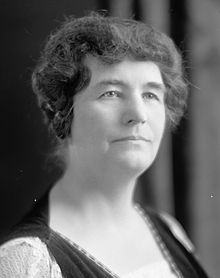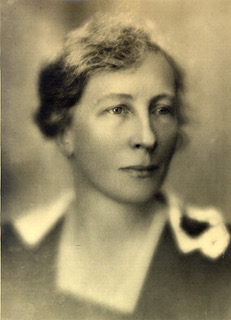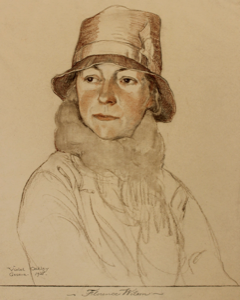by Dr. Katharina Rietzler
It is easy enough to assume that few women thought deeply about international relations in the first half of the twentieth century. Analyses of women’s marginalization from diplomacy, academia and intellectual life invite the conclusion that women were not there, bar some exceptional figures. Environments that were conducive to international theorising, the reasoning goes, were at the same time hostile to women. However, bearing in mind recent calls for the social grounding of intellectual history, maybe it is time to begin by studying the audiences and wider publics that women were able to address. In the United States, there were several avenues for women to gain paid employment, a public profile and intellectual recognition in so-called women’s professions. And, from the 1900s, some of these professions ‘went international’.
Together with Valeska Huber and Tamson Pietsch, I’ve explored the importance of women’s professions for international thought in a recent article in Modern Intellectual History (Huber, Pietsch, Rietzler 2019). Presenting case studies of three American women, we focus on their professional formation and how it shaped their careers and intellectual production. We discuss Fannie Fern Andrews (1867–1950), a schoolteacher and educational reformer whose peace curriculum taught American children how to deal with foreignness at home and abroad; Mary Parker Follett (1868–1933), who originally trained in social work but used her professional formation to rethink international, organisational and interpersonal relations in the context of organisational theory; and Florence Wilson (1884–1977), the chief librarian of the League of Nations, who merged theories of information management with theories of international governance.
These women thought about international society from distinct vantage points opened to them through their chosen professions. They were in active engagement with the ideas of their male contemporaries and sought to write themselves into the early-twentieth century conversation about international politics and institutions. At the same time, their respective professions informed their conceptualizations of international questions. Their ideas, and those of other professional women, we argue, remain to be explored by historians of international thought and a wider, reconceptualised disciplinary history of international relations (IR). Andrews and Wilson currently remain outside the bounds of disciplinary history, while Follett has received some recognition by IR scholars (e.g. Schmidt 1998, 168-71). Foregrounding the professional contexts of Andrews’, Follett’s and Wilson’s international thinking ultimately points to the gendered nature of the disciplinary and discursive boundary making that has characterized IR’s foundation.

As a co-founder of the American School Peace League, Fannie Fern Andrews regarded the modern teacher as an “international figure” who could instil “the principles of justice, peace and international unity” in children. She argued that “these sentiments can be taught” and provided teachers with pedagogical techniques and contexts in which emotions such as international friendship could become meaningful – a kind of do-it-yourself internationalism to socialize children into what Andrews imagined as the international community. As other white American internationalists at the time, Andrews believed in stark racial and civilizational hierarchies that structured this community. White, native-born Americans assumed a privileged position in it, setting an example to the rest of the world. Andrews’ techniques for encouraging world-mindedness in children and expressing it through concrete experience became popular among American schoolteachers by the 1920s. By that time, however, Andrews made a career change. She had always been interested in international law (in fact, her curriculum had a very legalistic bent to it) and in 1923, she completed a Harvard PhD on the League of Nations mandates regime. Andrews underlined the importance of the experience of American colonialism for analysing the mandates system as a form of imperial reform because of the “transitionary character of the guardianship” in American colonies. Her thesis was “pioneer work”, relevant to historians of US Empire today. However, she could not get it published. In the end, Andrews wrote a new book. The Holy Land Under Mandate combined the reproduction of government documents with autobiographical passages. It pandered to contemporary clichés about the Holy Land but also drew on Andrews’ pedagogical work that emphasised emotion and lived experience. Scholars mocked the “personal and chatty” register and denied Andrews the status of an international relations expert. As an intellectual, she remains relegated to the less prestigious categories of ‘educator’ and ‘campaigner’.

The same does not hold true for Mary Parker Follett, who did find scholarly recognition in the field of management and organisational studies. However, her lectures and publications are also highly relevant to early twentieth-century international thought and were significantly influenced by her chosen profession, social work. Follett put forth an inherently social view of the individual that saw the group as central to politics because it was only through the group that the individual could realize freedom and be heard above the crowd. For Follett, all sorts of groups were the foundation of group relations – including international organizations. And the process of “recogniz[ing] and unify[ing] difference” through these groups would, Follett argued, give rise not only to a new kind of national state, but also, “through the further working of this principle,” to a “world-state.” Follett’s themes of authority, function and responsibility, the psychology of control and consent, leadership and mediation appealed to a business and management audience. This was a field that was “blazing new trails” that could also “be applied to government or international relations.” Ultimately, Follett’s approach to power grew from her understanding of human psychology – she advocated not the “balance of power” but instead “a jointly developing power [that] means the possibility of creating new values.” In this way, she argued, human activity could be organised on a world scale.

Florence Wilson, head librarian of the League of Nations Library in Geneva, was also a committed supporter of international organisation but for her, it was the mechanics of information that enabled international decision making and expanded participation in the international community. She was the only woman member of the American Peace Commission at the Paris Peace Conference and was asked to establish the Library of the League of Nations in 1920. Wilson assigned a central role to expertise and information in a complex world in which knowledge was constantly changing and expanding. She believed that librarians should invest time in cataloguing, indexing and guiding researchers to sources, as requests were “for information rather than books.” After leaving Geneva in 1926, Wilson explored other ways of thinking about international information. She wrote The Origins of the League Covenant under the auspices of the Information Department of the Royal Institute of International Affairs, a work that emphasised process, organization, dissenting opinions and structures of power in the crafting of international legal frameworks. Wilson’s concern with the individual’s relation to international information resonates with the focus on political subjectivity and the Deweyan vision of participatory experience that can be found in Andrews and Follett, but Wilson emphasised accessibility. Her thinking about the role of information in international society prefigures not only Cold War approaches to public diplomacy, but also more recent concerns with networks, expertise and publicity. At the same time, the methods she proposed to enable access, the nature of the information she sought to mobilize, and the international community she imagined, exhibited the biases of American liberal internationalism, a trait she shares with Andrews.
Andrews, Follett and Wilson were not the only professional women whose training and experience outside the academic discipline of International Relations and its cognate disciplines in the interwar years (International Law, History, Psychology, Economics and Political Science) shaped their international thought. It also matters that these three women were trained in what is sometimes referred to as ‘service professions’. Indeed, this fact should lead us to question the inside/outside dichotomy that makes it so easy to dismiss these women as marginal to the history of international thought. After all, as their professions were conceptualised as being ‘for others’, they matter deeply to the wider structure that was international thinking in the interwar years.
References:
Valeska Huber, Tamson Pietsch & Katharina Rietzler, “Women’s International Thought and the New Professions, 1900-1940”, Modern Intellectual History (2019)
Brian Schmidt, The Political Discourse of Anarchy: A Disciplinary History of International Relations (New York, 1998)


Leave a Reply